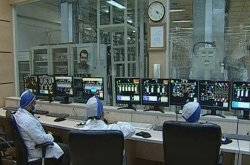The New York Times has reported that the US and Iran have agreed in principle to hold one-on-one negotiations on Iran's nuclear programme, but the White House quickly denied that any talks had been set.
The report, quoting unnamed officials, said earlier on Saturday the two sides had agreed to bilateral negotiations after secret exchanges between US and Iranian officials. The newspaper later said the agreement was "in principle".
The White House quickly denied the report, which came two days before President Barack Obama is due to face Republican presidential nominee Mitt Romney in a debate focused on foreign policy.
It's not true
"It's not true that the United States and Iran have agreed to one-on-one talks or any meeting after the American elections," National Security Council spokesperson Tommy Vietor said in a statement.
"We continue to work with the P5+1 on a diplomatic solution and have said from the outset that we would be prepared to meet bilaterally."
The P5+1 group is composed of the permanent members of the UN Security Council - the US, Britain, China, France and Russia - plus Germany.
Iran had insisted the talks with Washington not begin until after the November 6 election determines whether Obama will serve a second term or whether Romney will succeed him, the Times said.
The New York Times report looked likely to encourage campaign debate over foreign policy, where Romney has been hitting Obama with charges that he has been an ineffective leader who has left the country vulnerable.
The Obama administration counters that it has pressed hard on all major security challenges while at the same time winding down unpopular and expensive wars in Iraq and Afghanistan.
But tensions with Iran continue to simmer, leading many analysts to say it is the largest security issue facing the US and a potential flashpoint for broader conflict in the Middle East.
Crippling sanctions
The US has been working with the P5+1 to pressure Iran on its nuclear programme but with few results. The US and other Western powers have charged that Iran's nuclear programme is aimed at developing nuclear weapons, but Tehran insists the programme is for peaceful purposes.
Israel has said it would use military force to prevent Iran from becoming a nuclear power but has in the past had differences with Washington over when Tehran would actually cross the "red line" to nuclear capability.
The Times story quoted an unnamed senior administration official as saying the US had reached the agreement for bilateral talks with senior Iranian officials who report to Supreme Leader Ayatollah Ali Khamenei.
But the White House said the Obama administration was intent on its current "two-track" course, which involves both diplomatic engagement and a tightening network of international sanctions to pressure Iran.
"The president has made clear that he will prevent Iran from getting a nuclear weapon, and we will do what we must to achieve that," Vietor's statement said.
"It has always been our goal for sanctions to pressure Iran to come in line with its obligations. The onus is on the Iranians to do so, otherwise they will continue to face crippling sanctions and increased pressure."
Tehran's proposals ' non-starters'
The P5+1 has held a series of inconclusive meetings with Iranian officials in the past year. In July, Hillary Clinton, the US secretary of state, said Tehran's proposals to date had been "non-starters".
While Western officials say there is still time to negotiate, they also have been ratcheting up sanctions, which are contributing to mounting economic problems in Iran.
The US has expressed a willingness for talks narrowly focused on specific issues, preferably on the sidelines of multilateral negotiations. But Iran has been pressing for broader direct negotiations that include other regional issues including Syria and Bahrain - something the US opposes.
"We've always seen the nuclear issue as independent," the administration official told the Times, speaking on condition of anonymity because of the delicacy of the matter. "We're not going to allow them to draw a linkage".
The Times included the White House denial in a subsequent version of its story and said reports of the agreement had circulated among a small group of diplomats involved with Iran.
Even if the two sides sit down, American officials worry Iran could prolong the negotiations to try to forestall military action and enable it to complete key elements of its nuclear programme, particularly at underground sites, the Times said.
Any talks would open a diplomatic window for the US and Israel that could provide strategic cover should they see the need for military action down the road.
"It would be unconscionable to go to war if we haven't had such discussions," R Nicholas Burns, who led negotiations with Tehran as undersecretary of state in the George W Bush administration, told the Times.
PHOTO CAPTION
Iran maintains that its nuclear programme is solely for civilian purposes [Reuters]
Aljazeera


 Home
Home Discover Islam
Discover Islam Quran Recitations
Quran Recitations Lectures
Lectures
 Fatwa
Fatwa Articles
Articles Fiqh
Fiqh E-Books
E-Books Boys & Girls
Boys & Girls  Hajj Rulings
Hajj Rulings Hajj Fatwas
Hajj Fatwas














